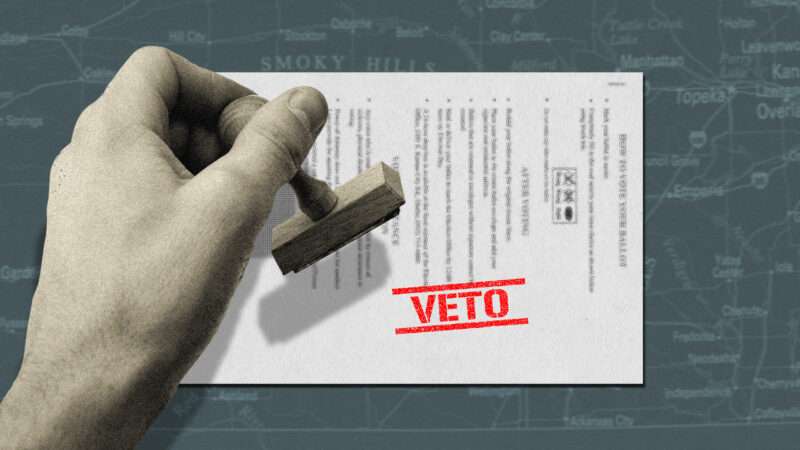
Lawmakers in Kansas are asking the state's voters to give them the power to bypass the governor's office and hack away at executive branch regulations.
But the proposal—a so-called "legislative veto"—raises some complex constitutional questions.
If approved by voters, Kansas's Constitutional Amendment 1 would allow the state legislature to revoke or suspend any executive branch rule or regulation with a simple majority vote in both chambers. Under current law, the legislature needs a supermajority and the approval of the governor to block executive branch rules—a setup that effectively dooms any such effort.
"Adoption of the amendment by the voters would return lawmaking authority to the lawmaking branch of government, the branch closest to the people," Kansas Attorney General Derek Schmidt wrote in testimony to the state legislature earlier this year. Schmidt, a Republican who is running for governor this year, is one of the prime supporters of the effort, which is also backed by a collection of business groups and pro-market nonprofits.
Politically, the amendment is a clear attempt at undermining the authority of current Kansas Gov. Laura Kelly, a Democrat and Schmidt's opponent in next week's gubernatorial election. Republicans enjoy a large majority in both chambers of the Kansas legislature, and Democrats have not had a majority in either chamber since 1991. Naturally, opponents of the proposal have tried to frame it as an overtly partisan attempt at shifting the political balance of power in the state, the Topeka Capital-Journal reports.
But it's more accurate to describe the proposal as a return to how Kansas' state constitution originally distributed political power. Until 1984, lawmakers in Kansas did have a "legislative veto" power.
That was a year after the U.S. Supreme Court ruled that the legislative veto was an unconstitutional violation of the Presentment Clause—the part of Article I that requires legislative action to be presented to the executive for approval. The Kansas Supreme Court followed suit, ruling that the state's legislative veto was "an unconstitutional usurpation of powers." That's why a constitutional amendment is required to re-impose the rule.
Like all structural changes to government operations, there's nothing inherently positive or negative about a legislative veto. While it could be useful for trimming the regulatory state, Cato Institute senior fellow Walter Olson warns that it can also become a mechanism for expanding government.
Enabling a state legislature or Congress to "bind executive agencies to its short-term wishes more efficiently could actually encourage big government by assuring members that they could go full speed ahead on far-reaching, ill-defined legislation, with its expansive delegation, while retaining a convenient brake pedal should things go so far as to provoke public backlash," Olson tells Reason. "One point of the separation of powers is to keep the branches from trying to yoke themselves together into a common harness."
The post Kansas Voters Could Give Legislature Power To Veto Executive Branch Regulations appeared first on Reason.com.







